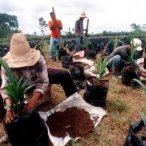
9 November 2011 | Special reports | Human rights | Climate Justice and Energy
Systematic Mechanization
Agrofuel companies repress, assault and fire workers in Colombia
Download: MP3 (5.6 Mb)
In Colombia, as well as in other countries, agrofuel promotion from pail oil or sugar cane does not only affect the rights of rural communities and promotes land and water concentration, but it also has negative effects for the workers of sugar refineries and plantations.
For this reason agrofuel workers participated in the Second National Forum on Agrofuels in Colombia held last week in Bogota.
Real World Radio interviewed Raul Antonio Chacon and Jose Reinel Flores at the forum. The former comes from Valle del Cauca region, the main area of extensive sugar cane plantations for ethanol production.
The latter is a member of a cooperative in Puerto Wilches, which is the form of labor flexibility found by the agrofuel companies, linked with palm oil processing to extract oil for agro-diesel.
On July 7, palm oil workers in Puerto Wilches region began collective bargaining with the company Empresa Oleaginosas de Bucarelia and in response to the company’s intransigence had to go on strike from August 23 until today.
It’s been almost three months of strike without the workers getting paid, which leads to a humanitarian crisis. The workers are protesting over labor rights violations, against the company’s intention to destroy the Collective Agreement reached with the workers and over the overexploitation and negotiation of fundamental rights through an intermediation system through which palm oil businessmen hire temporary workers and so called ’Associated Work Cooperatives or CTA’”.
Nearly 7,000 unionized workers from the CTA are blocking five palm oil extraction facilities.
On October 15 at noon, Police squads of Magdalena Medio de Barrancabermeja brutally assaulted the workers beating them and throwing tear gas and bombs at the civil population, including women, elderly people and children.
The intervention of national and international human rights organizations was then requested, as well as of the Attorney General, the Ombudsperson, the General Procurement Office and the Vicepresidency so that the union leaders are not taken to court.
Jose Reinel Flores talks about the incidents.
The workers’ demonstrations for the enforcement of their labor rights and good working condition began in 2008 when there were protests by sugar cane workers in Valle del Cauca, where one of the largest agroindustries for ethanol production is located.
The strike was long and ended with the workers victory, who for the first time had the right to participate in the weighing of the sugar cane they cut (their salary was based on the weight).
This protest led to the business strategy of mechanizing the sector, which resulted in the firing of many workers.
Several union leaders have been taken to trials with false testimonies by the corporations.
Photo: portafolio.co







